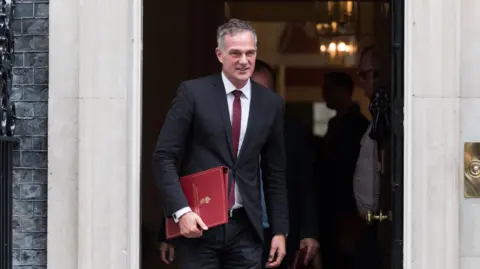Government considers social media time limits for children
 Getty Images
Getty ImagesThe government is considering introducing tougher online safety measures to limit the amount of time children can spend on social media, the BBC understands.
Proposals include a two-hour cap on the use of individual social media apps and a 22:00 curfew, as first reported by the Sunday People and the Mirror.
Appearing on the BBC's Sunday with Laura Kuenssberg programme, Technology Secretary Peter Kyle said he was looking at the "addictive nature of some of the apps and smartphones", when asked whether time limits would be considered.
But an online safety campaigner has accused the government of delaying bringing in new laws to protect children.
Ian Russell, whose daughter, Molly, took her own life at 14 after seeing harmful content online, said: "Every day the government has delayed bringing in tougher online safety laws we've seen more young lives lost and damaged because of weak regulation and inaction by big tech."
Mr Russell, who backed the previous government's Online Safety Act, said only "stronger and more effective" legislation would "finally change the dial on fundamentally unsafe products and business models that prioritise engagement over safety."
"Parents up and down the country would be delighted to see the prime minister act decisively to quell the tsunami of harm children face online, but sticking plasters will not do the job," he added.
Kyle told the BBC he had not been able to speak publicly about the government's plans to toughen online safety laws because legislation passed by the previous Conservative government in 2023 had yet to be enacted.
"This year we've had illegal content that needs to be taken down, but in July, age-appropriate material must be supplied by platforms, otherwise there'll be criminal sanctions against them," he told the BBC's Sunday with Laura Kuenssberg programme.
He said that he had been looking carefully at what government needed to do next to "nail down harder" on safety, "understand what a healthy online life for children" looked like and "stop the barriers" towards achieving that.
 Getty Images
Getty ImagesCurfews, along with screen time limits for both apps and devices overall, are already available to parents who use Apple or Google's parental controls.
TikTok introduced a 60 minute screen time limit by default for under 18s in 2023, although it can be switched off. Instagram invites users of all ages to set their own limit, after which they can opt to be blocked for the rest of the day.
However, it is not known how many people choose to activate these controls. In a speech last year, Sir Nick Clegg - the former director of public affairs at Meta, which owns Facebook and Instagram - said parental take-up of tools designed to help them manage their children's online activities was low.
Some parents say this is because there are so many offered by individual apps and companies that they find them overwhelming.
England's children's commissioner, Dame Rachel de Souza, called on the government to take stronger action to protect children from technological harm.
She said: "Technology is evolving at enormous pace, and this generation of children have never known life without the internet, so we have to be much bolder in how we respond to the risks they face. Children should not be expected to police the online world themselves.
"If companies cannot make online spaces safe for children, then they should not be in them.
"Any amount of time online is too long if the content they see is harmful. I continue to urge the government and Ofcom to strengthen both the Online Safety Act and the Children's Codes so that profit-making by platforms cannot come at the expense of protection."
In January, Kyle told the BBC that laws on internet safety were "very uneven" and "unsatisfactory", following calls from campaigners to tighten the rules.
The minister expressed his "frustration" with the Online Safety Act but did not commit to making changes to the legislation.
A Whitehall source later told the BBC there were no plans to repeal the act.
Another potential problem facing the idea of introducing legal time limits for children on social media is that the vast majority of tech firms are based in the US.
The Trump administration has been highly critical of foreign governments attempting to regulate its tech businesses and punish them for non-compliance.
In 2021, China imposed strict restrictions on online gaming, limiting players below the age of 18 to one hour per day on Fridays, weekends and holidays only. This replaced earlier limits of 90 minutes per day, rising to three hours during holidays.
The country cited concerns about the impact of "excessive" gaming on young people.
It was mulling further restrictions including limits on in-game purchases and daily log-in rewards, but last year the draft update disappeared from the government's website.
